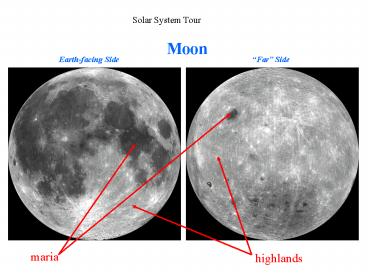Moon - PowerPoint PPT Presentation
1 / 61
Title: Moon
1
Moon
Solar System Tour
Earth-facing Side
Far Side
2
Moon (Mare Imbrium Copernicus)
(From Apollo 17 - 1972)
3
Moon (The Apollo Program)
Neil Armstrongs Footprint Apollo 11 - 1969
Buzz Aldrin Apollo 11 - 1969
Six Landings 1969 -72
4
Moon (Taurus-Littrow Landing Site)
Harrison Schmidt Apollo 17 - December 1972
5
Mercury
Mariner 10 (1974)
Messenger (launch 2004,orbit insertion 2011)
6
Mercury(Caloris Basin)
7
Mercury (Weird Terrain)
100 km
8
(No Transcript)
9
Venus
Magellan Radar Mapper (1990 - 1994)
Pioneer UV image
Venus Express (ends 2009)
10
Venusian Surface (Venera 13 - March 1982)
11
Map of Surface
Red, yellow high elevations Green, blue
rolling hills, lowlands
12
Venus (Crater Dickinson)
70 km
Impact crater
13
Volcanoes on Flank of Maat Mons
Volcanic crater caldera
14
Venus (Volcanic Pancakes)
15
Mars
Polar ice cap
Lowlands (rolling plains)
Highlands (plateaus, mountains)
(Hubble Space Telescope
red color iron oxide in the dust
16
Valles Marineris (from orbiter)
4000 km long, 120km across, 7 km deep
17
Mars (Olympus Mons - Solar Systems Highest
Mountain)
Elevation 25 km
550 km
18
Mars Evidence for past water flows
Mars
Earth
Sinuous channels
19
Mars (Islands in a Channel)
25 km
20
Mars (Summer at the South Pole)
400 km
21
(No Transcript)
22
Mars Moon Phobos
- 28 x 20 km
- Orbital period 7 ½ hours (rises in west, sets
in east)
23
Mars Exploration Rovers (Spirit and Opportunity)
Arrived - January 2004, still operating
24
Spirit in the Columbia Hills
25
Beads (or blueberries) indicate hematites,
which form in water
26
Asteroids
(Ida from Galileo)
27
Asteroid Orbits
28
Eros Rotation from Near Earth Asteroid Rendevous
(NEAR)
29
Jupiter
Galileo (1989)
30
Jupiters Great Red Spot
Earth on same scale
31
Rotation and Wind Patterns
32
Aurorae
33
Jupiter (Io Europa in their Orbits)
34
Jupiters Galilean Satellites (Plus Amalthea)
Io
Europa
Amalthea
Ganymede
Callisto
(From Apollo 17 - 1972)
35
Io - Voyager discovered active volcanoes!
36
Io Lava Flow (Liquid Sulfur)
37
Europa (Ice Fractures)
250 km
38
Ganymede (Impact af a Comet Torn Asunder by
Jupiter)
200 km
39
Callisto
40
Saturn
(Arrived 2004)
(Voyager 2)
41
Storms on Saturn
42
Close-up of B ring
Rings and gaps due to orbital resonances with
moons (21, 41, 32, etc.)
43
Saturns Mid-Sized Moons
Rhea wispy streaks release of water from
interior? Tethys, Dione maria due due flooding
from beneath? Iapetus leading face in orbit much
darker than trailing face
44
Enceladus
Reflects almost 100 of the light it receives -
covered with tiny ice crystals
45
- Plumes of water ejected from holes in the ice
46
Titan (From Voyager 2)
- has an atmosphere thicker than Earths
- primarily nitrogen some methane and argon
- thick layer of smog hydrocarbons (methane,
ethane, propane) - Methane rains down on surface to form temporary
lakes
47
- radar images shows rough (pink) and smooth
(blue/green) areas lakes of methane (CH4)
48
Uranus IR Images
(From Apollo 17
-
1972)
49
Neptune The Great Dark Spot
50
Neptunes Ring System
As with most other rings in solar system, they
consist of dirty chunks of ice
51
Neptunes moon Triton
nitrogen frost
Polar cap of methane ice
Material (soot) ejected by geysers
52
Pluto Charon
Pluto 2270 km in diameter, Charon 1300 km in
diameter
53
Two New Satellites Discovered!
- both only 200 km or less in size
54
Plutos atmosphere - mostly nitrogen
Artist rendition
- Nitrogen geysers like Triton, mixed with methane
- Only happens when Pluto is close to the Sun?
55
Pluto New Horizons Mission
- arrival at Pluto / Charon in July 2015
- will continue on to Kuiper Belt Objects (KBOs)
56
Comets
ion tail
dust tail
Sun
57
Comet Halley (1986)
58
Two comets in 1998
59
Giotto Image of Halleys Nucleus
60
- Meteor showers occur on the same day each year
61
Fireball very bright meteor
- amateur video showing fireball in NY during
football game































